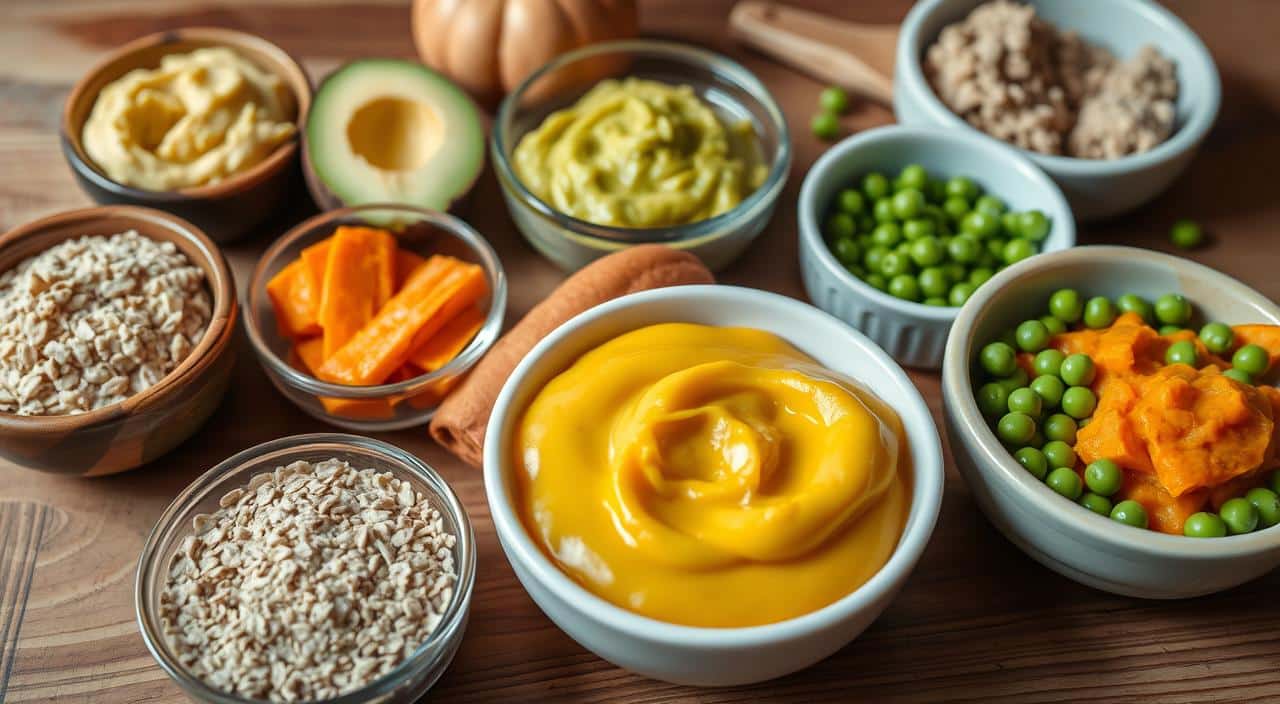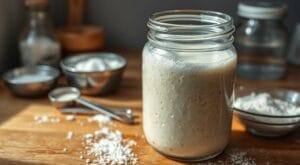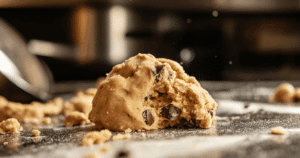Jump to:
Estimated reading time: 12 minutes
Table of contents
What are good baby foods to start with? Starting your baby on solid foods is a big step. It’s exciting but can feel scary for new parents. This article will help you find the best first baby foods. We’ll make sure your baby gets the nutrients they need to grow strong and healthy.
We’ll talk about iron-rich cereals and soft fruit and veggie purees. These are safe and nutritious choices to begin your baby’s solid food journey.
Key Takeaways
- The recommended age to begin introducing solids is close to 6 months, based on signs of readiness like good head control and ability to sit unassisted.
- Letting babies self-feed purées by placing them on a spoon promotes independence and exploration.
- Nutritious first food options include single-grain cereals, fruit purees, and vegetable purees like apples, avocados, bananas, and sweet potatoes.
- Preparing finger foods by cooking until soft and finely chopping or mashing is recommended around 8-10 months.
- Breastfeeding for the first 6 months and introducing allergenic foods early can help reduce allergy risks.
Introduction
When your baby hits the 4-6 month mark, it’s time to introduce solid foods. This is in addition to their breast milk or formula. Picking the best first baby foods is key for your child’s growth. This guide will show you the good baby foods to start with, how to prepare and store them, and their nutritional benefits.
The Dietary Guidelines for Americans and the American Academy of Pediatrics suggest introducing solid foods at 6 months. Starting before 4 months can pose health risks.
Your child should show signs of readiness, like sitting up alone and opening their mouth for food. They should also swallow food and bring objects to their mouth. Most kids can start eating solid foods at 6 months and enjoy different foods by 7-8 months.
“Encouraging good eating habits from an early age is crucial for the child’s development, emphasizing the importance of family meals and nutritious food variety.”
Studies show that family dinners are good for kids’ development. They help develop healthy eating habits for life. By choosing the best baby foods to start with, you’re setting a good example for your child’s future.
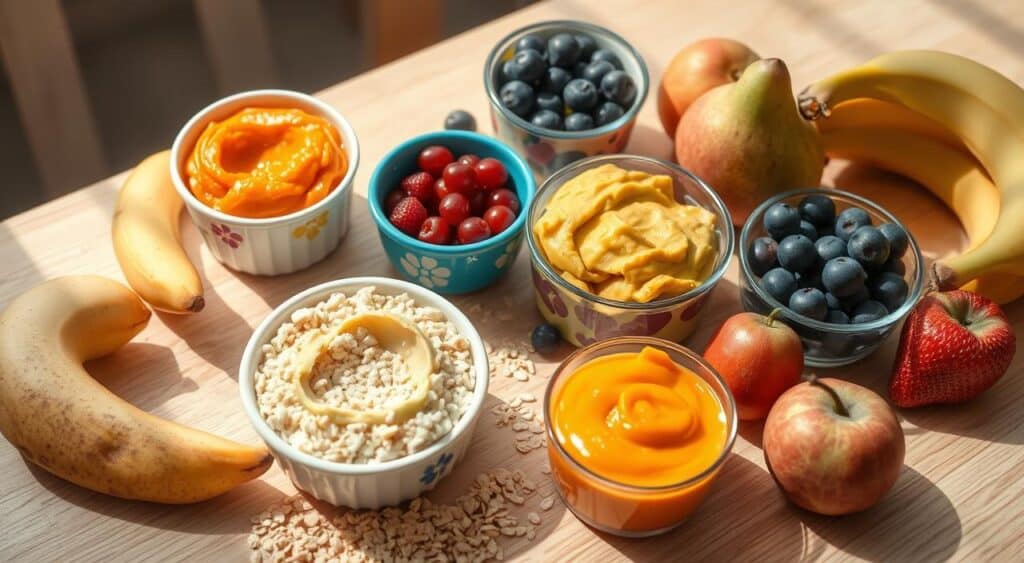
Why Choosing the Best First Baby Foods is Important
Introducing solid foods to your baby is a big step. It affects their health and growth. The foods you pick can shape their taste, give them key nutrients, and help them develop good eating habits.
Introducing Solid Foods to Babies
Look for signs your baby is ready for solids. They should be able to sit up, hold their head, and show interest in food. Breast milk is best for the first six months. Solid foods should come after six months, but not before four.
How Early Nutrition Impacts Baby’s Development
Babies need solid food for growth, especially iron and zinc. Start iron-rich foods around 6 months when their stores drop. A good start with food can benefit them for life.
Signs Your Baby is Ready for Solid Foods
By 6 months, babies show they’re ready for solids. They sit up, control their head, and try to eat. Make sure they sit up straight and face forward to avoid choking.
Choosing the right first foods is key. It helps your baby get the vitamins and nutrients they need for growth and learning.
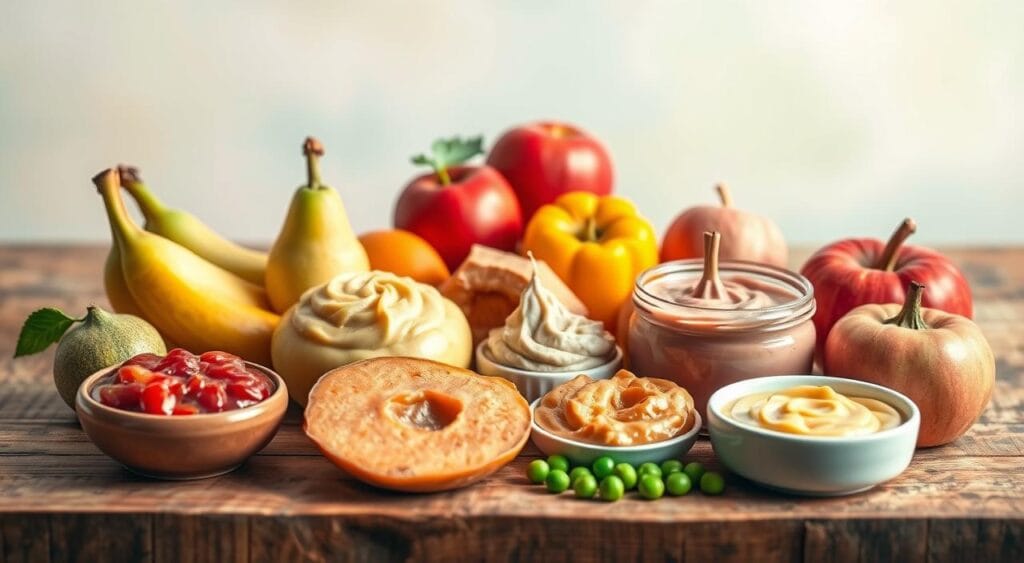
Best First Baby Foods to Start With
Introducing solid foods is a big step. Pediatricians suggest starting with a variety of foods. This includes single-grain cereals, fruit purees, and vegetable purees. These foods are key for your baby’s growth and health.
Single-Grain Cereals: Iron-Rich and Easy to Digest
Single-grain cereals, like oatmeal or barley, are great for babies. They are easy to digest and full of iron. This is important for your baby’s development.
Fruit Purees: Gentle and Naturally Sweet Options
Fruit purees like bananas and apples are gentle for babies. They are sweet and full of vitamins and minerals. These help your baby grow strong.
Vegetable Purees: Packed with Nutrients for Growth
Vegetable purees like carrots and peas are also good choices. They are full of vitamins and minerals. These support your baby’s growth and health.
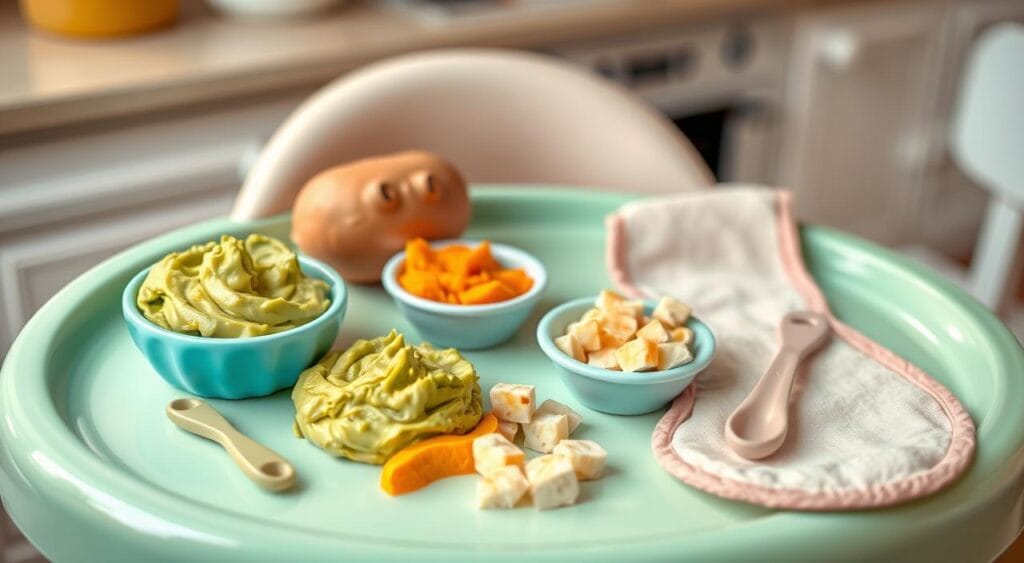
“Introducing a variety of nutritious foods early on is key for optimal growth and development.”
Offering a mix of best first baby foods is important. This includes single-grain cereals, fruit purees, and vegetable purees. It helps your baby get a good start with solid foods.
Tips for Preparing the Best First Baby Foods
Starting your baby on solid foods is exciting. Remember a few key tips to make it smooth. Introduce foods one at a time, adjust textures, and choose between homemade or store-bought. These steps ensure a healthy start for your baby’s food journey.
How to Introduce One Food at a Time
Start with one new food at a time, waiting 3-5 days before introducing another. This helps spot any allergies. Start with small amounts and increase as your baby gets used to it.
Adjusting Textures and Consistencies for Your Baby’s Age
Begin with foods that are very smooth and easy to slide off a spoon. As your baby grows, introduce thicker textures. This helps them learn to chew and swallow. Always watch for your baby’s signs and adjust the foods as needed.
Homemade vs. Store-Bought Baby Food: What’s Best?
Both homemade and store-bought baby foods are good choices. Homemade lets you control what goes in, while store-bought is convenient and offers many flavors. Think about what’s best for your family’s lifestyle and taste preferences.
“The texture and consistency of your baby’s first foods should start out super smooth and easily drippable off the spoon.”
How to Customize Baby’s Diet with Healthy Options
As your baby starts eating solid foods, you can add more healthy choices. This is a fun time to introduce new tastes and textures. It helps shape their taste and ensures they get all the nutrients they need.
Mixing Fruits and Veggies for Flavor Variety
Mixing pureed fruits and veggies is a smart way to give your baby many nutrients. Try blending soft fruits like pears with leafy greens or root veggies. This makes meals tasty and full of nutrients. Then, add stronger flavors like berries or citrus to broaden their taste.
Incorporating High-Iron Foods for Balanced Nutrition
It’s important for your baby to get enough iron for growth. Add iron-rich foods like pureed meats, lentils, or iron-fortified cereals to their meals. These foods are packed with nutrients and meet their growing needs.
Adding Mild Herbs and Spices Safely
Adding mild herbs and spices can make your baby’s food more interesting. Start with small amounts of spices like cinnamon or ginger. Watch how they react. Always introduce new flavors slowly to avoid any allergic issues.
By mixing fruits, veggies, high-iron foods, and gentle spices, you can enrich your baby’s diet. This helps their taste buds grow and ensures they get the nutrients they need to be healthy.
Common Mistakes to Avoid with First Baby Foods
When you start your baby on solid foods, it’s key to avoid mistakes that can harm their health. One big mistake is introducing too many new foods at. This can upset their stomach and raise the chance of allergies. Start slow, introducing one new food at a time, and watch for any signs of trouble.
Not Watching for Allergic Reactions
It’s vital to watch how your baby reacts to new foods. Look out for rashes, swelling, or tummy troubles. If you see any of these, talk to your doctor right away. Early introduction to foods like eggs, peanuts, and tree nuts can lower allergy risks by up to 81%.
Over-Processing the Food and Losing Nutrients
It’s important to make sure your baby’s food is smooth but not over-blended. This can help keep more nutrients in. Try to keep as many natural nutrients as you can, whether you make food at home or buy it.
| Mistake | Impact | Solution |
|---|---|---|
| Introducing foods too quickly | Overwhelms digestive system, increases allergy risk | Introduce one new food at a time, monitor for reactions |
| Not watching for allergic reactions | Potential for adverse reactions like rashes, swelling, digestive issues | Pay close attention to baby’s response, consult pediatrician if concerns |
| Over-processing the food | Strips away valuable nutrients | Preserve natural nutritional content, whether homemade or store-bought |
Avoiding these mistakes can make sure your baby’s first taste of solid foods is safe and healthy. This sets a good foundation for a lifetime of eating well.
Storing and Serving the Best First Baby Foods
Storing and serving baby food safely is key. For homemade food, use airtight containers or ice cube trays for freezing. These can stay in the fridge for 3-5 days or the freezer for 2-3 months. Check out this guide for more tips.
Best Storage Methods for Homemade Baby Food
Here are some tips for safe storage:
- Use airtight containers or silicone ice cube trays for freezing.
- Freeze purees for up to 2-3 months.
- Keep fresh purees in the fridge for 3-5 days.
- Always label containers with date and contents.
How Long You Can Store Baby Food Safely
The shelf life varies by storage and food type. Here’s a general guide:
| Storage Method | Shelf Life |
|---|---|
| Refrigerator | 3-5 days |
| Freezer | 2-3 months |
Proper Reheating Techniques for Safe Consumption
When reheating, use gentle methods to keep nutrients and avoid burns. Here’s how:
- Heat food in a microwave-safe bowl, stirring often.
- Use a double boiler or warm water bath for slow heating.
- Avoid direct stovetop heating to prevent hot spots.
- Always check the food’s temperature before serving.
“Proper storage and serving techniques are essential for ensuring the safety and quality of your baby’s first foods.”
Nutritional Benefits of the Best First Baby Foods
The best first baby foods introduce solid foods gently. They also give essential nutrients for growth and development. These foods, from iron-rich cereals to vitamin-packed fruit and vegetable purees, are key for a healthy start.
Key Nutrients for Babies: Iron, Vitamins, and Protein
Iron is vital for making healthy red blood cells and preventing anemia in babies. Meats, lentils, and fortified cereals are great sources of iron. Vitamins A, C, and D, along with protein, are also crucial for the body, immune system, and tissue repair.
Importance of Balanced Nutrition in First Foods
Offering a mix of fruits, vegetables, and whole grains gives babies a wide range of vitamins and minerals. This balanced diet is the foundation for a lifetime of healthy eating.
Monitoring Baby’s Growth and Dietary Needs
Keep an eye on your baby’s growth and dietary needs as they grow. Watch for their cues, growth patterns, and health to ensure they get the right nutrition.
“Nutrient-rich purees support proper growth and development in babies, while freshly sourced ingredients reduce the risk of allergic reactions.”
Frequently Asked Questions: What are the best baby foods to start with?
How do I introduce these first foods to my baby?
Begin with small amounts, like one or two teaspoons, and introduce only one new food every 3-5 days. This allows you to watch for any signs of allergies or sensitivities.
Are fruits or vegetables better to start with?
Either is fine to start with! Some parents choose vegetables first to avoid a preference for sweet flavors, but fruits like apples or pears are also mild and nutritious. Both are packed with essential vitamins and nutrients for growing babies.
When should I start introducing protein?
Around 7-8 months, you can introduce protein sources like pureed chicken, lentils, or tofu. Proteins provide essential nutrients for growth and development and can be mixed with vegetables for balanced meals.
Are grains safe for baby’s first foods?
Yes, single-grain cereals like iron-fortified oatmeal or rice cereal are traditional first foods. They’re easy to digest and provide essential nutrients like iron, which babies need as their own iron stores decrease around 6 months.
Conclusion: Helping Your Baby Thrive with the Right First Foods
Starting your baby on solid foods is a big step. It’s exciting and crucial for their growth. Choose foods like iron-rich cereals and soft fruits and veggies. These give your baby the nutrients they need to grow strong.
Start with small amounts and watch for any signs of allergy. A balanced diet is key for your baby’s health. This helps them grow well.
Choosing the right first foods sets your child up for a healthy future. Whether you start at 6 months or use baby-led weaning, offer foods rich in nutrients. This supports their body and mind.
As your baby gets older, introduce new tastes and textures. This helps them enjoy a wide range of foods. With patience and advice from doctors, your baby will get the nutrients they need. Every baby is different, so be ready to adjust your approach as they grow.
